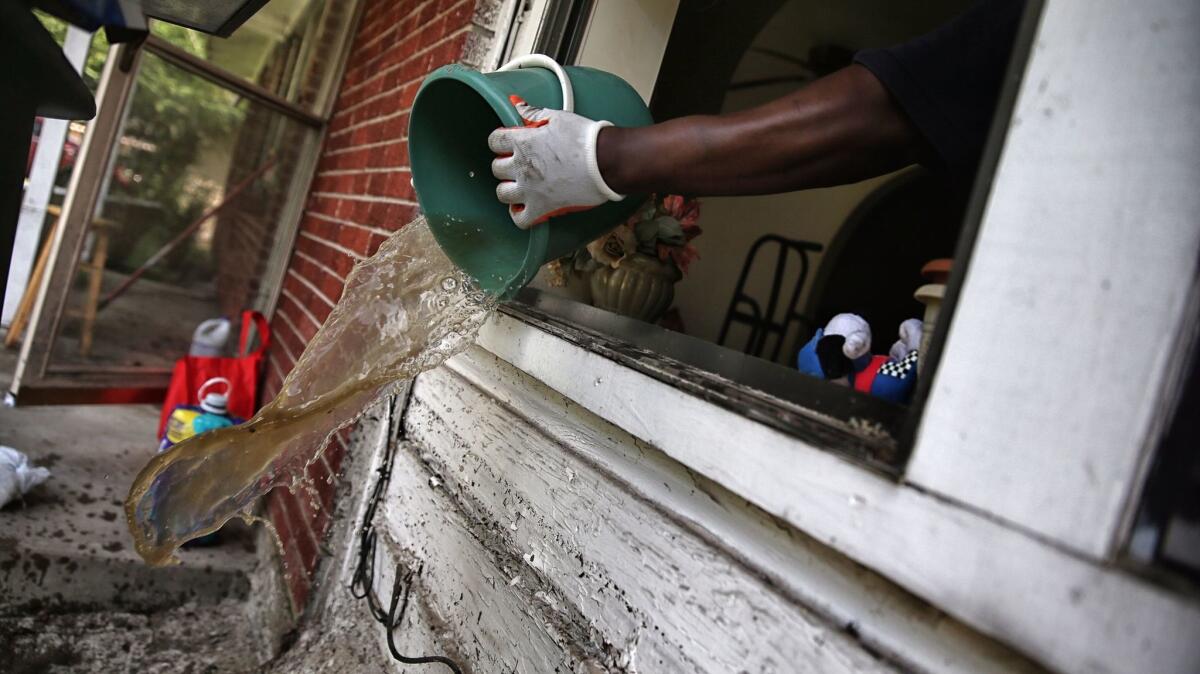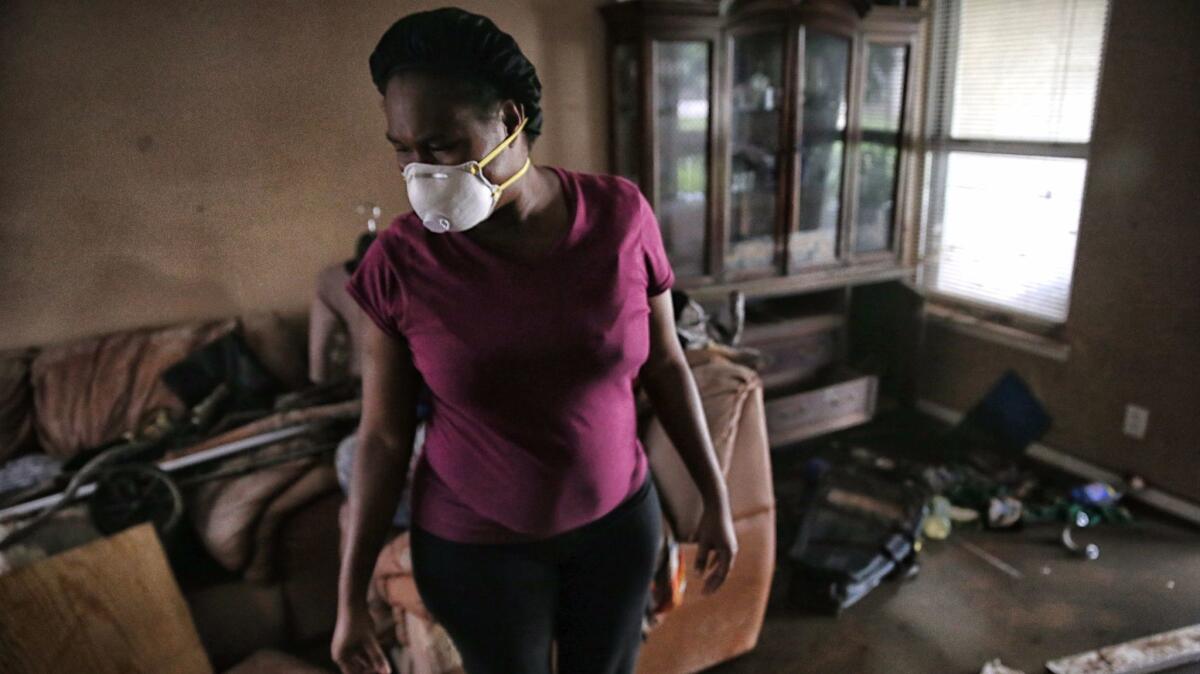In Harvey’s aftermath, the long wait sets in, keeping tensions high

Lowering the humidity will make everything dry more quickly and clean more easily. (Sept. 7, 2017)
- Share via
Reporting from Houston — They idled the afternoon away, stationed behind a barricade of half-inch plywood that kept the boat wake from rolling through their front door.
The water on the street had turned from clear to brown, and gone up and down for days.
Drew Connor, 33, gauged its height where it lapped at the bricks on his mailbox pillar.
“It looks like it’s gone down a brick,” he told his wife.
Water had not crept into their home in west Houston, but with no Internet or television, he and his wife, Hailey Hughes, had little to do but sit on the stoop, and wait — as their neighborhood reverted to wilderness. Fish hawks hunted on the streets. The night buzzed like a jungle. Houses began to decay.
The tragedy and drama of Harvey were profound. But since the storm passed, and as the nation prepared for new devastation from Hurricane Irma, the reality for most people in the Texas flood zones has been a long, buggy trip back to a more primitive time — and an anxious and excruciatingly boring wait.
Waiting for the FEMA man, waiting for insurance adjusters, waiting for the water to recede, waiting for the power to come on, waiting for the walls to dry, waiting for contractors, waiting for a spot at the shelter, waiting to find a hotel, waiting to get out of the in-laws’ house.
Connor and Hughes let flooded neighbors stay in their home; they waited as their guests worked to move furniture and clothes to second stories, secure their homes, turn off power and retrieve personal documents and photos.
One day, Hughes kayaked to her aunt’s house a mile away, and as she passed other hold-outs scattered about on their own desert islands, they asked her what was happening “over there or back there.” She felt like a 19th century postman carrying news across the frontier.
As they relaxed on their front entry, Connor drinking a whiskey and Coke, an airboat roared through, setting off the cicadas.
When the shrill petered out, it was dead quiet.
“It’s like zen,” she said.
“It gets old,” he said.
“It’s been up and down for me,” he added about his mood. “Crazy then calm, crazy then calm.”
“My mom told me I should grind up some pills and give them to him,” she said.
They figured when they were done helping neighbors, they’d leave and stay with her family.
For those whose homes flooded, the wait has been all the more miserable.
The smell of mold and algae, silt packed on the floors, putrid refrigerators that beached in odd rooms like dead whales.
Those who had second stories moved into them. Many went to shelters or moved in with family members and friends. Many others stayed to protect their homes from looters, to rip out carpets and drywall, to be there when FEMA arrived.
Streets east of downtown, where the waters receded last week, now had berms of flood detritus instead of curbs — bedraggled couches, tables, warped cabinets, clothes, muddy carpets, sheetrock turned to sludge.
The sun came out blistering and tropical, and mosquitoes found paradise.
“Are you the FEMA man?” a resident asked a reporter walking down such a road, St. Louis Street, in the Trinity/Houston Gardens neighborhood.
All eyes were eagerly upon him, until he said he wasn’t. They went back to work or talking. Many were trying to get their flood insurance adjuster on the phone or a FEMA inspector to view their damage.
Some of them got this message on the FEMA website: “The inspection of your property is pending because the area where your property is located is inaccessible.”
Truth was, the federal inspectors could surely access the street — the postal carrier rolled down the block with ease. But the numbers of people filing applications for relief online were overwhelming.
James Jackson, 57, used a bucket to scoop the last couple inches of water out of a low spot in his family home. The smell inside was noxious. His older sisters lived there now, and he doubted they had any kind of insurance.

“I think they’re just waiting for FEMA.”
In Kashmere Gardens, to the south, Renee Bradford sat in her apartment with the fan on and windows open, waiting and hoping for the stench to dry out.
The uncertainty felt like a pit in her gut. Bradford, 58, said she just had a brain tumor removed and couldn’t go back to work as a pharmacy technician because of dizzy spells. But she was still waiting for her disability payments to be approved. Her friend had let her stay in the apartment for free. Now it was in ruins.
She’d been sleeping at a family member’s place, but the quarters were cramped and she didn’t want to be a burden, so she spends days here trying to figure out what to do.
She teared up looking at the mess of her belongings, rotting in heaps. “I want to be self-sufficient.”
In a public housing project in the Fifth Ward, Roderick and Kimberly Francis had escaped the storm to find themselves knee-deep in the bureaucratic bog.

At a downtown shelter, they registered with FEMA and the agency said it would pay their bills at approved hotels. Happy to have some privacy, they reserved a room at the Comfort Inn and Suites. But when they arrived, the man at the front desk said they did not qualify. He called FEMA and handed her the phone. “All of our representatives are busy; please call again.”
Kimberly felt what didn’t “qualify” was the high rate the hotel was charging, not the family. But she had no way to prove it. So she paid $129 and hoped to be reimbursed later. The next night’s rate was $151.
They started couch-surfing with family members after that, spending their days dragging their salvageable stuff to a storage locker. Roderick met with a FEMA inspector who took pictures of the apartment and their losses.
The apartment was unlivable. Even the inspector said so. But the manager told them they had to pay their $706 rent on time or be evicted — and bumped out of public housing for good.
So now they were again waiting — on hold on their cellphones while navigating a different federal agency website, hud.gov.
And the biggest problem: At each part of their journey through limbo, they were among thousands, all waiting, as FEMA looks to become even more burdened, when Irma reaches the Florida Straits.
ALSO
Four deaths reported as Irma rakes across the Caribbean
Manson follower granted parole in notorious killings, Brown will make final decision
Who are the ‘Dreamers’? You might be surprised.
UPDATES:
1 p.m.: This article was updated with details of Hurricane Irma.
This article was originally published at 3 a.m.
More to Read
Sign up for Essential California
The most important California stories and recommendations in your inbox every morning.
You may occasionally receive promotional content from the Los Angeles Times.











